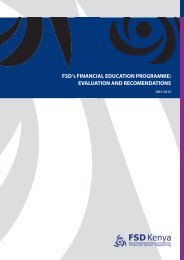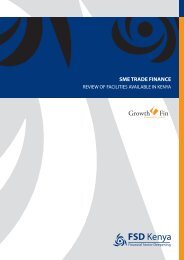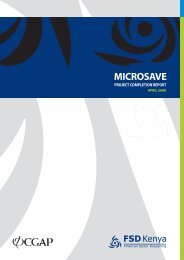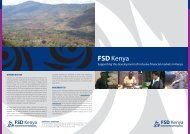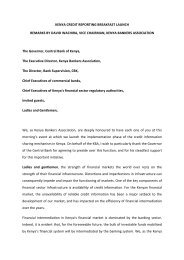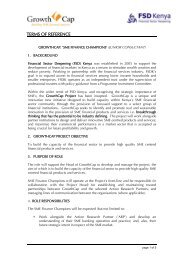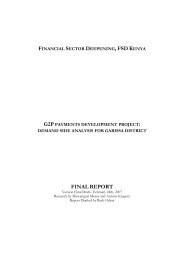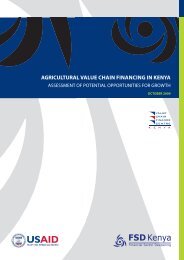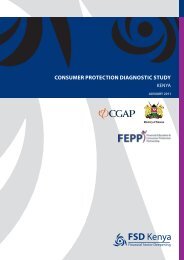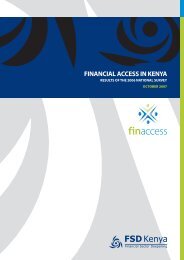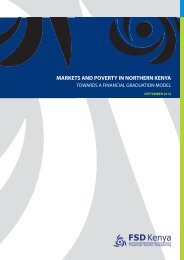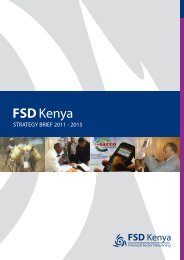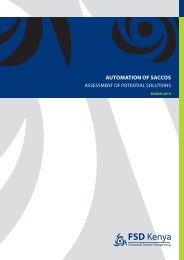2009 - FSD Kenya
2009 - FSD Kenya
2009 - FSD Kenya
You also want an ePaper? Increase the reach of your titles
YUMPU automatically turns print PDFs into web optimized ePapers that Google loves.
There have been some signs of interest in improving integration of the payments<br />
system from a few players but no tangible results as yet. Policymakers have<br />
indicated a growing interest in this subject given its potentially far-reaching<br />
impact on costs across the financial system. Work is needed to frame policy in<br />
this area and some preliminary research and analysis is expected soon. In an<br />
interesting innovation during the year, M-PESA linked up with the independent<br />
automated teller machine (ATM) network, PesaPoint, allowing customers to<br />
withdraw cash from their M-PESA accounts at ATMs.<br />
There were promising signs of increased dynamism in Information and<br />
Communication Technology (ICT) provision to the financial sector. One provider<br />
launched an outsourced solution targeting SACCOs and MFIs. If effective this<br />
could provide a major step forward in improving effective automation of<br />
smaller institutions, improving their competitiveness. The communications<br />
infrastructure necessary to support outsourced back-office service provision in<br />
<strong>Kenya</strong> is starting to improve dramatically with the development of a national<br />
network of fibre-optic for internet backhaul already partially completed and<br />
the three largest mobile phone operators (Safaricom, Zain and Orange) already<br />
providing ‘last mile’ wireless connection to a growing number of rural areas.<br />
Other players are also set to enter the market for ‘last mile’ with the competing<br />
WiMax technology which promises to provide significant geographical cover<br />
at relatively low infrastructure cost.<br />
Policy and legal framework<br />
<strong>2009</strong> saw continued progress on the implementation of regulatory frameworks<br />
for deposit-taking MFIs and SACCOs. The first licence was granted to Faulu<br />
under the Microfinance Act and it opened its first deposit taking branch. KWFT<br />
continued to work on meeting the outstanding requirements, highlighting<br />
the challenges posed to even a relatively sophisticated institution. A joint<br />
government-industry taskforce on SACCO regulation was formed early in the<br />
year and produced draft regulations and an initial plan for the establishment<br />
of the new SACCO Societies Regulatory Authority (SASRA). The board was<br />
appointed and there is a clear commitment from the Minister of Co-operatives<br />
to move towards implementation of the new framework as quickly as possible.<br />
There will be challenges in developing sufficient capacity in the new regulator<br />
to introduce the new regime to a sub-sector which has had relatively little<br />
effective oversight for many years.<br />
Some uncertainty remains over the status of the non-deposit taking MFIs and<br />
SACCOs. Many non-deposit taking MFIs take compulsory savings – a position<br />
which probably puts them in breach of the Microfinance Act. The SACCO<br />
Societies Act, 2008 clearly defines deposit taking. Nevertheless communicating<br />
the difference between a deposit taking and non-deposit taking SACCO will<br />
nevertheless probably continue to be muddied by the use of the terms ‘front<br />
office savings activity (FOSA)’ and ‘back office savings activity (BOSA)’ which<br />
the SACCO movement has used for some time. Legally the critical issue is<br />
whether the deposit is able to be withdrawn on demand by a customer, not<br />
<strong>FSD</strong> KENYA <strong>2009</strong> ANNUAL REPORT • 9<br />
where it is nominally domiciled in the SACCO. A majority of MFIs and SACCOs<br />
are expected to continue as non-regulated institutions, though in aggregate<br />
they are likely to contribute significantly less than the relatively few, licensed<br />
deposit takers.<br />
In relation to the banking sub-sector work on implementation of credit<br />
information sharing made progress during the year with a roadmap<br />
developed for the process. Piloting across commercial banks is expected early<br />
in 2010. While the process has been prolonged it has now acquired a clear<br />
momentum.<br />
Perhaps the most significant development of the year was the amendment of<br />
the Banking Act to allow banks to use agents. The CBK has moved very swiftly<br />
to develop regulations, producing a first draft by the end of the year following<br />
a study commissioned by <strong>FSD</strong> and a study tour supported by the Alliance for<br />
Financial Inclusion (AFI). Two options were proposed: a market based – largely<br />
leaving risk control to market signals or a systems approach – looking to assess<br />
risk from the level of agent networks as a whole. Either would significantly<br />
reduce compliance costs compared with the current orthodox approach<br />
to channel regulation involving direct approval of every outlet. The latter<br />
would seriously hamper the potential extent of agent networks and speed<br />
of deployment. CBK has indicated its desire to encourage greater outreach<br />
through the use of this channel and to minimise the compliance burden within<br />
the constraints of controlling risk and protecting clients. Although hard data<br />
is difficult to obtain on the likely marginal cost of delivery on the institution<br />
side, compared with a conventional branch channel the expectation is that it<br />
will offer significant cost savings. As noted above the availability of points of<br />
presence closer to rural clients could results in considerably lower transaction<br />
costs.<br />
A government/CBK audit of the M-PESA system at the beginning of the<br />
year, supported by the findings from the CBK/<strong>FSD</strong> study, gave M-PESA a<br />
clean bill of health from a regulatory perspective and silenced calls from the<br />
banking industry for regulatory action. Nevertheless it increased pressure for<br />
the introduction of an appropriate regulatory framework. The long awaited<br />
National Payment Systems bill is anticipated to move forward during 2010<br />
to provide the necessary legislative framework. Work has already started on<br />
developing the necessary regulations under the new legislation.



